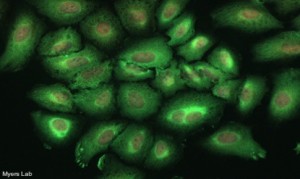Lab Projects
Disease-Related Investigation
 Disease-related research in the Myers Lab includes investigating cancer and neurological/neuropsychiatric disease, advancing the understanding of gene regulatory mechanisms and improving and using bioinformatics tools and techniques. We are involved in technical development for sequencing microRNA from blood plasma and analysis of healthy and disease-related signatures in cell-free DNA extracted from plasma. The lab also works with isolation of unique and shared T cell receptor repertoires associated with cancer and aging in peripheral blood and solid tumors. We are discovering cancer and disease-specific genomic signatures for diagnostic and prognostic prediction models, and we are applying CRISPR/Cas9 technology to biological questions of human disease. Along with HudsonAlpha faculty investigator Greg Cooper’s lab, we work with the Clinical Sequencing Exploratory Research (CSER) program to identify genomic diagnoses for children with developmental delay.
Disease-related research in the Myers Lab includes investigating cancer and neurological/neuropsychiatric disease, advancing the understanding of gene regulatory mechanisms and improving and using bioinformatics tools and techniques. We are involved in technical development for sequencing microRNA from blood plasma and analysis of healthy and disease-related signatures in cell-free DNA extracted from plasma. The lab also works with isolation of unique and shared T cell receptor repertoires associated with cancer and aging in peripheral blood and solid tumors. We are discovering cancer and disease-specific genomic signatures for diagnostic and prognostic prediction models, and we are applying CRISPR/Cas9 technology to biological questions of human disease. Along with HudsonAlpha faculty investigator Greg Cooper’s lab, we work with the Clinical Sequencing Exploratory Research (CSER) program to identify genomic diagnoses for children with developmental delay.
Cancer
We are researching kidney cancer, prostate cancer, pancreatic cancer, colon cancer, ovarian cancer, and breast cancer. Our breast cancer research included triple negative breast cancer, ER/PR+ breast cancer in young women and clinical trials. Researchers from the Myers Lab are members of HudsonAlpha’s breast and ovarian cancer research team.
Neurological/Neuropsychiatric Disease
The Myers Lab has made advances in understanding ALS, Parkinson disease and Huntington disease and is directing research toward Alzheimer disease. We are also investigating schizophrenia, major depressive disorder and bipolar disorder.
Gene Regulatory Mechanisms
We investigate nuclear receptors in gene regulation and develop functional screens for determination of tissue-specific enhancers and influences of transcription factor binding.
Bioinformatics
We are developing analytical pipelines for RNA-seq and microRna-seq datasets along with tools and methods to visualize and analyze big genomic datasets. Our work in the CSER project includes informatics and data analysis.
